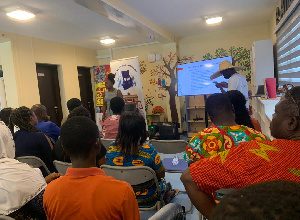The evolution of technology in recent years has sparked significant public and media discourse, anticipations, and concerns about robotics and its ability to ensure positive transformation in every sector around the world. With the rise of artificial intelligence and its incorporation into robotics, there are encouraging signs that robotics will significantly improve its performance in various sectors of the economy over the next decade. There have always been two schools of thought in Ghana when it comes to robotics. The first group believes that delving into robotics is a luxury Ghana cannot afford right now, while the second is concerned that the introduction of robots in Ghana will result in job losses. It may interest you to know that not only is establishing a robotics industry in Ghana necessary, but Ghana is losing a lot more than it is gaining by not pursuing it – and here are some of the reasons why.
Manufacturing
Manufacturing contributes significantly to the strength, development, and economic stability of many developed economies, including the UK and Germany. Indeed, the industrial revolution (where and when manufacturing as we know it today began) is thought to have sparked Britain’s rise to fame and power a few centuries ago. With the implementation of the One District One Factory (1D1F) program, the Ghanaian government has joined the ranks of economies that see manufacturing as a key driver of development. Although Ghana produces a significant amount of goods, there is still room for improvement.
To establish manufacturing plants capable of mass-producing products in the larger quantities envisaged, thereby creating the increased job opportunities desired and positively driving our economy, we must consciously introduce and instill the use of robots and robotic systems.
Robots can help improve production efficiency and quality by improving the accuracy and precision of many manufacturing processes within the manufacturing plant. In the manufacture of automobiles, for example, there are aspects of the manufacturing process that, if left to humans, may result in cars that are not only dissimilar but also have significantly reduced durability or quality.
At the BMW MINI Manufacturing plant in the UK, for example, robots are required at the sections where the metal pieces that comprise the vehicle’s body are to be brought together and welded. This is not to say that humans cannot do the job, but for the quality of vehicles BMW wants to produce, the level of precision required to ensure that every vehicle body of a specific model comes out accurately is better handled by robots than by humans. The humans can then concentrate on monitoring the manufacturing process to ensure that all machines and systems are operating properly. Another area of the car manufacturing plant where robots are required is the lifting of delicate but heavy parts, such as the windscreen or dashboard, to be fitted to the vehicles on the assembly line during final assembly.
Again, while humans are capable of performing this task, they do so with less precision and typically take longer (possibly requiring more people) than robots.
Many Ghanaians, both in rural and urban areas, work in manufacturing, such as preparing charcoal, making gari, or making soap. However, only one or a few people are usually working on one of these at a time, and there is only so much a man or woman with no machine aid can produce in a given amount of time. Consider how much more value we could add if we expanded some of these operations with the help of robots.
Consider a woman in a Ghanaian village who has decided to make a living by producing and selling gari. Even if she is able to produce gari entirely on her own, with no assistance from others and/or virtually no tools or machinery other than the bowls and fire she is already using, there is only so much she can do per unit time, so even if we assume she is able to sell all of the gari she produces, the profits may not be sufficient to allow her to make ends meet.
She could increase productivity and make more money if she could collaborate with others and possibly obtain some machinery to support what she is doing. However, it is worth noting at this point that not only will she be able to make ends meet for herself, but others with whom she will be working will also be able to do so.
Now, if she could improve the quality of her gari and optimize her manufacturing process, she would not only be lowering her gari production costs, but she would also be able to produce more gari per day with the resources she currently has. This is where robotics enters the picture.
Emergency Response and Disaster management
Disaster management is another area of Ghana’s economy where robots will be required. Ghana has seen several major multi-story buildings collapse, including the Melcom shop in Accra in November 2012 and, more recently, the AkyemBatabi church in the Eastern Region, which collapsed in October 2020, killing many people and destroying much property. In such cases, robots could assist with the rescue mission, for example, lifting heavy slabs of debris that may have pinned a victim somewhere within the rubble, saving critical time that could have saved a victim who would otherwise have died. Surveillance robots can also be sent in to search for more victims among the rubble in crevices too small for humans to navigate. Robots (or drones, to be more specific) can also assist in the delivery of life-saving items such as medicine, food, and/or blood in areas where traditional modes of transportation are impractical.
Robots can also be designed to be more resistant to toxic environments than humans. Plans for the construction of a nuclear power plant in Ghana are well underway, and while we hope that no nuclear accidents occur, we must take some precautions in case they do. In the event of a nuclear accident in which hazardous waste has been spilled, sending humans into the affected area to fix problems is not a good idea. In this regard, robots are a better option.
In extreme cases, such as a fire outbreak, drones can be used to fly over the scene of the fire and more effectively extinguish it. These are just a few of the many ways robots can aid in disaster relief.
Education
Ghana already has a lot of robotics activity in the field of education, with Legos, Raspberry Pis, and Arduinos, as well as many off-the-shelf components that make the design and build of robotics systems easier, being seen all over the country. Many junior and senior high schools have started robotics clubs, and some institutions even have their own robotics labs.
There have also been competitions to encourage children to build robots or robotic systems, such as the First Lego League competition held in June this year at the Legon Campus with support from the Ghana Education Service (GES), and the Sci-Tech Challenge organized about a month later on the Academic City University College campus by Primetime (organizers of the National Science and Math Quiz).
Robotics is a multidisciplinary activity that requires knowledge from several fields, including programming, mechanical engineering, electrical engineering, and electronics engineering. Students learn how to identify real-world challenges, develop solutions to them, assemble components, and code as a result of these educational programmes. They stimulate their cognitive functions, boost their confidence, and contribute to the country’s overall intellectual wealth by generating ideas that lead to fruitful products and, in turn, create more jobs, thereby improving the economy in the long run.
Conclusion
To address the concern that the introduction of robots will result in job losses, I’d like to point out that many manufacturing plants thrive on the presence of automation and robotics. I cannot say for certain that such companies would not have existed without the presence of these robots, but it is certain that the presence of these robots has allowed the companies to not only employ more people but also pay higher wages. I had the pleasure of working with BMW MINI Manufacturing, UK, a few years ago, where, despite the fact that at least a third of manufacturing activity was controlled by robotics, the company employed over 5000 people and produced close to 1000 cars per day. While I cannot justify the need for every single robot in this plant, I can say that the plant would struggle to be as successful if many of these robots were not available.
Yes, robots have the potential to take over some jobs, but thieves and armed robbers have the potential to rob us of the things we have worked so hard for. Should we stop working because of this? By no means. Indeed, if properly managed, robots have the potential to create more jobs than they destroy.
In conclusion, there is no doubt that the introduction of robots and robotic systems into Ghana’s manufacturing industry can strengthen its manufacturing base, thereby creating more jobs and, ultimately, strengthening our economy. Furthermore, we can see from the preceding explanation that robots play an important role in our educational system as well as disaster management, among other fields. If, for example, drones are already providing critical solutions in some parts of Ghana, such as transporting blood and medical supplies between hospitals and areas where road transportation would be difficult (if not impossible), we can confidently state that a robotics industry in Ghana is quickly becoming a necessity rather than a luxury.
By:Julian Bennett
Lecturer (Mechanical and Industrial Systems Engineering Department)
Academic City University College













